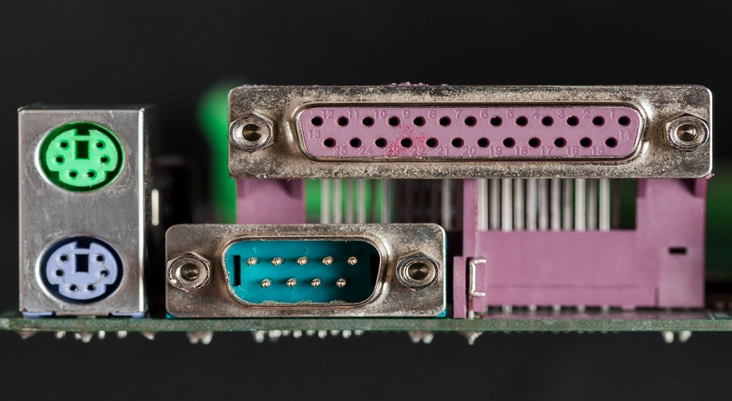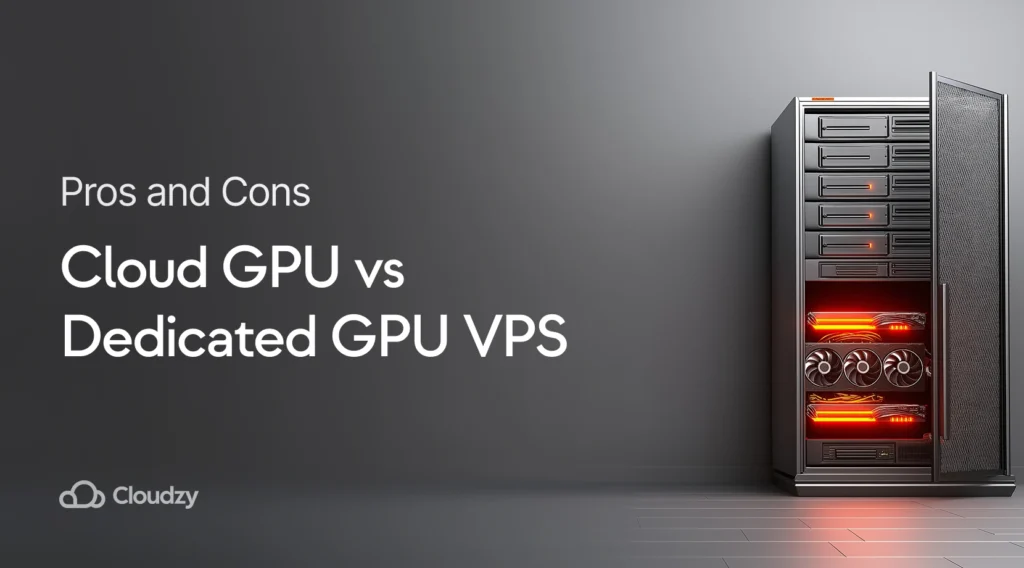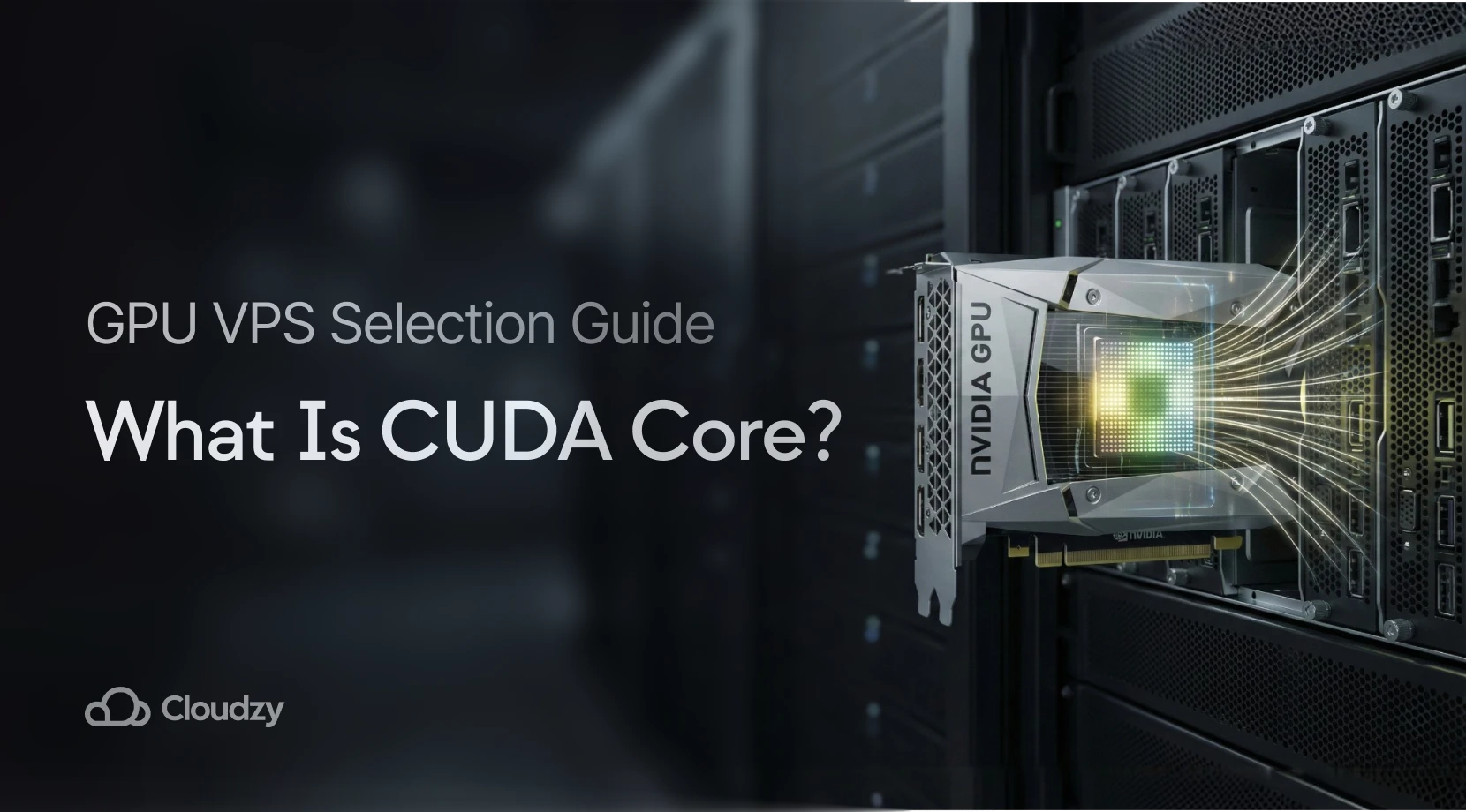According to those demanding very heavy GPU tasks like deep learning, 3D rendering, live game streaming GPU, or other serious internal workload, getting the right GPU hosting is not just a right choice to make but rather a necessity. This brings one to the age-old question many have to deal with: Should you go for a cloud GPU or for a dedicated GPU VPS?
Cloud GPU hosting provides flexibility and immediate access, while dedicated GPU VPS hosting provides performance without the possibility of sharing resources. What to choose from then?
We’ll look at the basic differences in performance as well as pros and cons in real world examples and how to choose between one or the other based not only on the specs of performance but based on what you will actually need.

What Exactly is a Cloud GPU VPS?
The availability of GPU power through cloud services has been a game-changer in cloud computing. Now, you can tap into these powerful resources either as a dedicated parallel processing power or as part of a virtual machine you rent. It’s a pretty exciting development, honestly.
A cloud-GPU VPS is your personal graphics processor hidden securely in someone else’s infrastructure. Grab these GPU resources whenever your need arises, scale up, and down as your workload demands, and pay only for what you have used!
This architecture could really give a workload that may suddenly spike here some nice breathing room, like project-based work or sudden spurts of activity. It really flips a giant, bold underline under the “physical versus virtual GPU” talk.

And What About a Dedicated GPU VPS?
Don’t let the name fool you; a dedicated GPU isn’t always something you can just physically pull out or that connects to the motherboard in the traditional sense. What “dedicated” truly means here is that the graphics card boasts its own dedicated RAM, completely separate from the computer’s main memory.
A dedicated GPU VPS gives you exclusive access to a physical GPU, often thanks to clever technologies like GPU passthrough. You still get that familiar flexibility you love from a virtual private server, but now with that, non-shared GPU performance. It’s almost like having your very own high-performance workstation, virtually “rented” in the cloud.
By the way, if you’re curious to dig even deeper, our article “What Is GPU VPS?” is a fantastic read!

Key Differences: Cloud vs Dedicated GPU
Choosing between cloud GPU hosting and a dedicated GPU VPS really boils down to understanding the mechanics behind each option. Let’s unpack them:
When it comes to resource allocation, cloud GPUs often mean sharing virtual hardware; it’s flexible, but performance can vary. With a dedicated GPU, that powerful hardware is all yours, ensuring consistent, reliable power
For performance, cloud GPUs are fine for lighter tasks, but if you need serious muscle for things like AI training or 4K rendering, a dedicated GPU delivers near bare-metal performance. More technical comparisons are in our “vGPU vs. Dedicated GPU” article.
Scalability and flexibility are where cloud GPUs shine—they’re super agile, quick to deploy or dismantle. A dedicated setup is less flexible for rapid changes, but offers a supremely stable environment for long-term work.
Looking at pricing and cost efficiency, cloud GPUs are budget-friendly for short-term needs, but costs can climb with continuous use. A dedicated GPU involves a larger initial commitment, but generally offers better value over time for consistent workloads. Browse our GPU VPS Hosting Plans for current rates.
Finally, for security and control, while cloud GPU setups are secure, they are shared. For ultimate control and isolation, especially with sensitive data, a dedicated GPU gives you root access and invaluable peace of mind.

Use Case Scenarios: Which One Fits You?
Specs and benchmarks are helpful, of course, but the real question is how well a solution really fits your actual work. Here’s a simple breakdown to help you figure it out:
| Persona | Recommended Option | Why |
| AI/ML Developers | Dedicated GPU VPS | For stable training and no shared resources |
| 3D Artists / Render Farms | Dedicated GPU VPS | Requires high-performance rendering |
| Gamers / Streamers | Dedicated GPU VPS | Ensures consistent frame rates, low latency |
| Startups Testing at Scale | Cloud GPU | Scalable and low-commitment |
| IT Admins / Enterprise Tools | Depends on workload | Needs a mix of control and cost-efficiency |
Still scratching your head? You might benefit from comparing GPU VPS vs. CPU VPS to really nail down what’s truly essential for your specific workload.

Pros and Cons: Cloud GPU vs Dedicated GPU VPS
Here’s a breakdown to help you make an informed choice for your workload:
Advantages of Cloud GPU:
- Scale on Demand
- Zero Maintenance Headaches
- Always There
- Pay-as-You-Go Freedom
- Access Cutting-Edge Tech
- Seamless Automation
Disadvantages of Cloud GPU:
- Long-Term Costs Can Add Up
- Storage Isn’t Always Simple
Advantages of Dedicated GPU:
- More Affordable Long-Term
- Total Hardware Control
- Predictable Billing
- Perfect for Constant Workloads
- Customize Your Setup
Disadvantages of Dedicated GPU:
- No Automatic Scaling
- You’re on Maintenance Duty
- Availability Can Be Tricky
- Fewer Locations

Final Verdict: Choose Based on Needs, Not Just Specs
Ultimately, there’s no single “better” option—only what’s truly best for you.
Cloud GPU hosting is incredibly flexible, accessible, and a fantastic choice for short-term or experimental projects. A dedicated GPU VPS, conversely, offers stability, raw power, and proves cost-effective over the long haul. Your decision should genuinely reflect how much performance, control, and scalability your specific projects genuinely demand.
At Cloudzy, we’re proud to offer both cloud and dedicated GPU hosting, so you never have to compromise. Whether you’re just starting to test the waters or ready to scale up, we have the infrastructure that adapts to your journey.




One thought on “Choosing Cloud GPU or Dedicated GPU VPS: Which One is Right for You?”
It’s a tough choice between Cloud and Dedicated GPUs depending on the workload. Cloud options are ideal if you need to scale on demand or manage variable workloads. But, if you’re running something resource-intensive consistently, having a dedicated GPU might ensure smoother and more predictable performance.